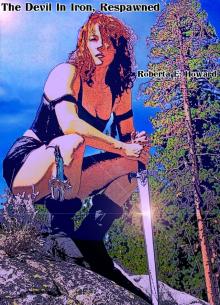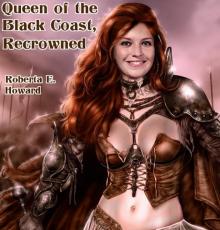- Home
- Roberta E. Howard
Red Nails, Polished
Red Nails, Polished Read online
Red Nails, Polished
Roberta E. Howard
Copyright 2010 Roberta E. Howard
A Conyn the Barbarian Story
A Gender Switch Adventure
The Skull on the Crag
The man on the horse reined in his weary steed. It stood with its legs wide-braced, its head drooping, as if it found even the weight of the gold-tassled, red-leather bridle too heavy. The man drew a booted foot out of the silver stirrup and swung down from the giltworked saddle. He made the reins fast to the fork of a sapling, and turned about, hands on his hips, to survey his surroundings.
They were not inviting. Giant trees hemmed in the small pool where his horse had just drunk. Clumps of undergrowth limited the vision that quested under the somber twilight of the lofty archs formed by intertwining branches. The man shivered with a twitch of his magnificent shoulders, and then cursed.
He was tall, full-chested, and large-limbed, with compact shoulders. His whole figure reflected an unusual strength, without detracting from the masculinity of his appearance. He was all man, in spite of his bearing and his garments. The latter were incongruous, in view of his present environs. Instead of a skirt he wore short, wide-legged silk breeches, which ceased a hand's breadth short of his knees, and were upheld by a wide silken sash worn as a girdle. Flaring-topped boots of soft leather came almost to his knees, and a low-necked, wide-collared, wide-sleeved silk shirt completed his costume. On one shapely hip he wore a straight double-edged sword, and on the other a long dirk. His unruly golden hair, cut square at his shoulders, was confined by a band of crimson satin.
Against the background of somber, primitive forest he posed with an unconscious picturesqueness, bizarre and out of place. He should have been posed against a background of sea clouds, painted masts, and wheeling gulls. There was the color of the sea in his wide eyes. And that was at it should have been, because this was Valerian of the Red Brotherhood, whose deeds are celebrated in song and ballad wherever seafarers gather.
He strove to pierce the sullen green roof of the arched branches and see the sky which presumably lay above it, but presently gave it up with a muttered oath.
Leaving his horse tied, he strode off toward the east, glancing back toward the pool from time to time in order to fix his route in his mind. The silence of the forest depressed him. No birds sang in the lofty boughs, nor did any rustling in the bushes indicate the presence of small animals. For leagues he had traveled in a realm of brooding stillness, broken only by the sounds of his own flight.
He had slaked his thirst at the pool, but now felt the gnawings of hunger and began looking about for some of the fruit on which he had sustained himself since exhausting the food originally in his saddlebags.
Ahead of him, presently, he saw an outcropping of dark, flintlike rock that sloped upward into what looked like a rugged crag rising among the trees. Its summit was lost to view amidst a cloud of encircling leaves. Perhaps its peak rose above the treetops, and from it he could see what lay beyond--if, indeed, anything lay beyond but more of this apparently illimitable forest through which he had ridden for so many days.
A narrow ridge formed a natural ramp that led up the steep face of the crag. After he had ascended some fifty feet, he came to the belt of leaves that surrounded the rock. The trunks of the trees did not crowd close to the crag, but the ends of their lower branches extended about it, veiling it with their foliage. He groped on in leafy obscurity, not able to see either above or below him; but presently he glimpsed blue sky, and a moment later came out in the clear, hot sunlight and saw the forest roof stretching away under his feet.
He was standing on a broad shelf which was about even with the treetops, and from it rose a spirelike jut that was the ultimate peak of the crag he had climbed. But something else caught his attention at the moment. His foot had struck something in the litter of blown dead leaves which carpeted the shelf. He kicked them aside and looked down on the skeleton of a woman. He ran an experienced eye over the bleached frame, but saw no broken bones nor any sign of violence. The woman must have died a natural death; though why she should have climbed a tall crag to die he could not imagine.
He scrambled up to the summit of the spire and looked toward the horizons. The forest roof--which looked like a floor from his vantage point--was just as impenetrable as from below. He could not even see the pool by which he had left his horse. He glanced northward, in the direction from which he had come. He saw only the rolling green ocean stretching away and away, with just a vague blue line in the distance to hint of the hill range he had crossed days before, to plunge into this leafy waste.
West and east the view was the same; though the blue hill-line was lacking in those directions. But when he turned his eyes southward he stiffened and caught his breath. A mile away in that direction the forest thinned out and ceased abruptly, giving way to a cactus-dotted plain. And in the midst of that plain rose the walls and towers of a city. Valerian swore in amazement. This passed belief. He would not have been surprised to sight human habitations of another sort--the beehive-shaped huts of the black people, or the cliff-dwellings of the mysterious brown race which legends declared inhabited some country of this unexplored region. But it was a startling experience to come upon a walled city here so many long weeks' march from the nearest outposts of any sort of civilization.
His hands tiring from clinging to the spirelike pinnacle, he let himself down on the shelf, frowning in indecision. He had come far-- from the camp of the mercenaries by the border town of Sukhmet amidst the level grasslands, where desperate adventurers of many races guard the Stygian frontier against the raids that come up like a red wave from Darfar. His flight had been blind, into a country of which he was wholly ignorant. And now he wavered between an urge to ride directly to that city in the plain, and the instinct of caution which promped his to skirt it widely and continue his solitary flight.
His thoughts were scattered by the rustling of the leaves below him. He wheeled catlike, snatched at his sword; and then he froze motionless, staring wide-eyed at the woman before him.
She was almost a giant in stature, muscles rippling smoothly under her skin, which the sun had burned brown. Her garb was similar to his, except that she wore a broad leather belt instead of a girdle. Broadsword and poniard hung from her belt.
"Conyn, the Cimmerian!" ejaculated the man. "What are you doing on my trail?"
She grinned hardly, and her fierce blue eyes burned with a light any man could understand as they ran over him magnificent figure, lingering on the swell of his splendid pectorals beneath the light shirt, and the clear white flesh displayed between breeches and boottops.
"Don't you know?" she laughed. "Haven't I made my admiration for you plain ever since I first saw you?"
"A mare could have made it no plainer," he answered disdainfully. "But I never expected to encounter you so far from the ale barrels and meatpots of Sukhmet. Did you really follow me from Zarallo's camp, or were you whipped forth for a rogue?"
She laughed at his insolence and flexed her mighty biceps.
"You know Zarallo didn't have enough knaves to whip me out of camp," she grinned. "Of course I followed you. Lucky thing for you, too, boy! When you knifed that Stygian officer, you forfeited Zarallo's favor, and protection, and you outlawed yourself with the Stygians."
"I know it," he replied sullenly. "But what else could I do? You know what my provocation was."
"Sure," she agreed. "If I'd been there, I'd have knifed her myself. But if a man must live in the war camps of women, he can expect such things."
Valerian stamped his booted foot and swore.
"Why won't women let me life a woman
's life?"
"That's obvious!" Again her eager eyes devoured him. "But you were wise to run away. The Stygians would have had you skinned. That officer's sister followed you; faster than you thought, I don't doubt. She wasn't far behind you when I caught up with her. Her horse was better than yours. She'd have caught you and cut your throat within a few more miles."
"Well?" he demanded.
"Well what?" She seemed puzzled.
"What of the Stygian?"
"Why, what do you suppose?" she returned impatiently. "I killed her, of course, and left her carcass for the vultures. That delayed me, though, and I almost lost your trail when you crossed the rocky spurs of the hills. Otherwise I'd have caught up with you long ago."
"And now you think you'll drag me back to Zarallo's camp?" he sneered.
"Don't talk like a fool," she grunted. "Come, boy, don't be such a spitfire. I'm not like that Stygian you knifed, and you know it."
"A penniless vagabond," he taunted.
She laughed at him.
"What do you call yourself? You haven't enough money to buy a new seat for your breeches. Your disdain doesn't deceive me. You know I've commanded bigger ships and more women than you ever did in your life. As for being penniless--what rover isn't, most of the time? I've squandered enough gold in the seaports of the world

 Jewels of Gwahlur, Reboxed
Jewels of Gwahlur, Reboxed Worms of the Earth Reburied
Worms of the Earth Reburied The Bull Dog Breed Retrained
The Bull Dog Breed Retrained Skull Face Revealed
Skull Face Revealed Scarlet Citadel Retaken
Scarlet Citadel Retaken The Devil in Iron, Respawned
The Devil in Iron, Respawned Shadow Kingdoms Fallen
Shadow Kingdoms Fallen Red Nails, Polished
Red Nails, Polished Beyond the Black River Again
Beyond the Black River Again A Witch Shall Be Born Once More
A Witch Shall Be Born Once More The Pool of the Black One, Reswum
The Pool of the Black One, Reswum Queen of the Black Coast, Recrowned
Queen of the Black Coast, Recrowned Solomyn Kane Relentless
Solomyn Kane Relentless